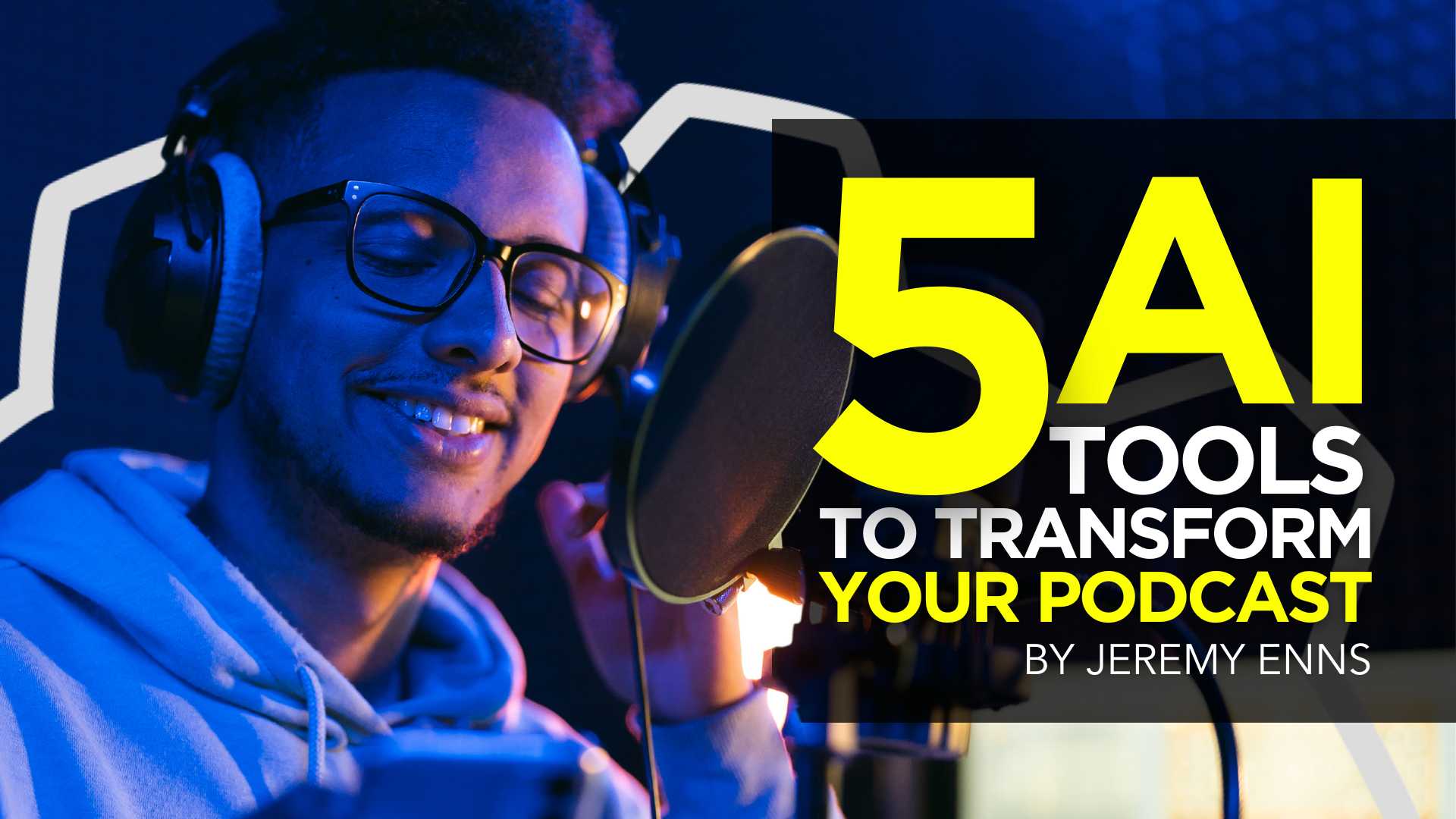5 AI Tools to Transform Your Podcast Production & Marketing Process
We’ll look at 5 AI podcasting tools you can start using today to create a better show and reach more people for less money and in less time. The post 5 AI Tools to Transform Your Podcast Production &...


After years of speculating about whether the buzz around AI was justified, by now, most of us as marketers and entrepreneurs have accepted that the promise of AI-enabled tools is real.
It’s clear that AI technology will impact (and perhaps radically transform) almost every aspect of our work and lives.
Podcasting is no exception.
And while there are certainly challenges AI will present to us as podcasters, content creators, and marketers, there are also some incredible benefits.
Specifically, those benefits revolve around the ways in which AI will make our jobs easier when it comes to creating, repurposing, and marketing our shows to get them in front of our ideal listeners, and ultimately, clients and customers.
So in this article, we’ll look at 5 AI podcasting tools you can start using today to create a better show and reach more people for less money and in less time.
1. AI-Generated Podcast Show Notes
If you’re like most podcast hosts, writing show notes for each episode is likely one of your least favorite parts of the production process.
Fortunately, a growing number of AI-writing assistants like Capsho have emerged to help take this time-intensive (not to mention boring) task off your hands.
All you have to do is upload your finished audio file and Capsho will automatically write your episode’s show notes, suggest a title, create a transcript, pull out quotes, generate social captions, and even repurpose your episode into a blog post, newsletter, and LinkedIn article.
Keep in mind you’ll still need to do some manual tweaking to polish off the AI-generated, but for many hosts, Capsho, or similar tools like Swell or Podcast Marketing.ai can get you 90% of the way there.
2. AI-Generated Podcast Promotional Assets
One of the best ways to drive awareness of your show is by repurposing it into short-form video.
And while manually combing through your episodes in search of the perfect clip can be a painstaking process, once again, AI has come to the rescue.
If you’re already recording video for your podcast, Vidyo is a nifty tool that automatically identifies, pulls, and captions compelling clips from any video file you upload.
In addition to a number of high-quality, customizable templates, Vidyo also has a nifty feature that automatically cuts between speakers, helping keep your viewers engaged on longer clips.
If you don’t record video for your podcast, not to worry.
Dubb is another podcast repurposing tool that generates AI-created background animations & transcripts from your uploaded audio files to create unique and engaging videos instantly.
3. AI Podcast Post-Production
So far, we’ve explored AI tools to help you repurpose your finished episode recordings. But there are a number of tools designed to make creating a high-quality show easier in the first place.
Descript has been on the scene the longest and has a whole suite of editing features including AI-generated transcript creation, audio clean-up, automatic filler-word removal, and more.

Want to get certified in Content Marketing?
Leverage the tools and channels to predictably and profitably drive awareness, leads, sales, and referrals—EVERYTHING you need to know to become a true master of digital marketing. Click Here
But while Descript certainly has a powerful feature set, it’s far from the only option.
Perhaps the most intriguing new tool is Adobe Podcast.
While it’s currently still in beta, Adobe has released a couple of features for free, including their jaw-dropping Enhance Speech tool, which uses AI to transform almost any recording into an NPR-quality finished product (seriously).
With tools like Enhance Speech, the barriers to entry in terms of recording gear, software, and technical know-how is rapidly dropping, meaning one less layer of friction between your ideas and your audience.
4. AI Voice Generation
One of the most fascinating applications of AI when it comes to podcasting is AI voice generation.
Maybe you’re a writer who would love to turn your blog posts into podcast episodes but doesn’t have the time, for example.
No problem.
With Listnr, you can simply upload your text, choose your voice (currently over 70 languages available with dozens of accent variables in each), and generate an audio version of your article in minutes.
But say you want to make things a bit more personal.
In addition to its post-production and editing tools, Descript’s Overdub feature allows you to train an AI voice model on your own voice.
Once the model has been trained, you can use Overdub to do everything from typing in a replacement word for one you flubbed during the recording to generating new custom audio content based on text.
5. AI Video Alteration
Our final entry into the list might not apply to every podcaster, but it’s no doubt one of the coolest AI tools I’ve come across to date, especially if you record video for your podcast.
When it comes to production quality, there’s no denying that eye contact with the camera is one of the most important factors to consider.
For solo videos, eye contact allows for a more personal, intimate experience for your viewers. For interviews, that depth of connection extends to your guest as well, leading to better interviews, and a better experience for both them and your audience.
The problem (as we’ve all experienced on countless awkward Zoom calls) is that you can’t look at the camera and your guest’s video (or your script) at the same time.
To solve this, most serious video podcasters and YouTubers eventually opt to invest in bulky, often expensive teleprompters.
With NVIDIA’s new Eye Contact tool (a part of their Broadcast app), however, teleprompters might soon become obsolete.
The tool uses AI to seamlessly edit your video feed in real time so your eyes always remain locked on the camera, even while you’re taking notes or reading from a script.
Honestly, it’s kind of mind-blowing.
Unfortunately, Broadcast is only available for Windows right now, though I have no doubt we’ll be seeing more tools like this emerge for other operating systems soon enough.
How Will AI Impact Your Production Workflow?

The AI arms race is well underway, both in terms of the development of new technologies and applications, as well as the adoption of those tools by small businesses, marketers, and creators looking to get a leg up on the competition.
While there are certainly still kinks to be ironed out, it’s clear that AI-enabled tools have emerged as viable options to help us create better content faster and cheaper than we could just a couple of years ago.
If you’re like me, this has you excited.
It means we can spend less time on the menial admin work that doesn’t make use of our unique talents and perspective, and more time on the creative, ideas-driven work that only we can do.
And it’s that work that will ultimately allow us to move our businesses forward.

 Astrong
Astrong 









_1.jpg)



_2.jpg)



















